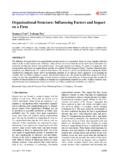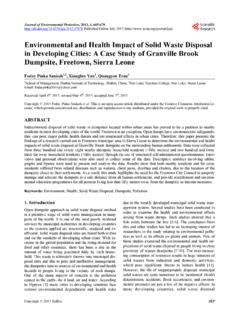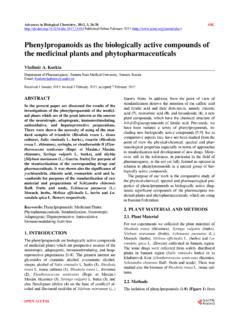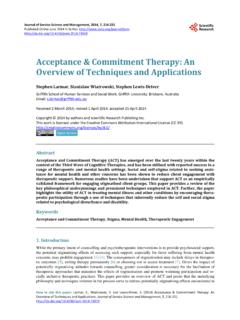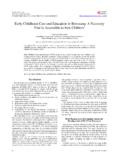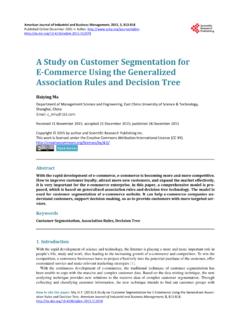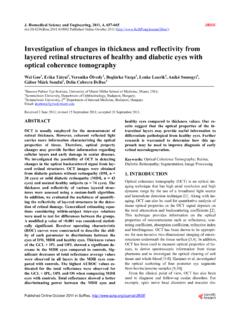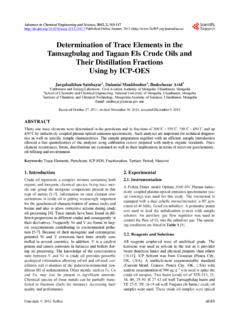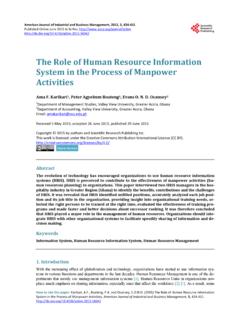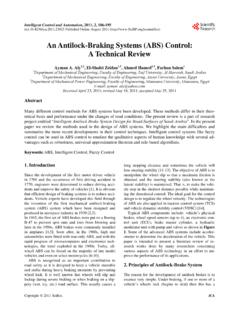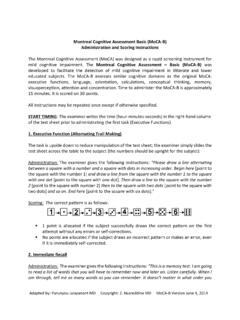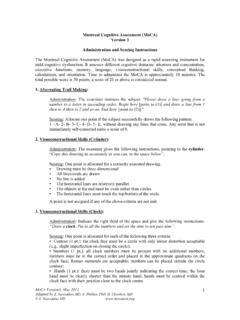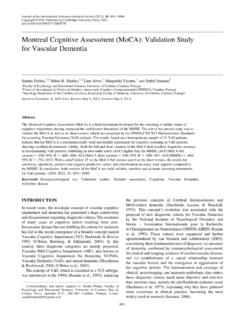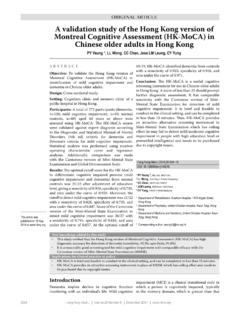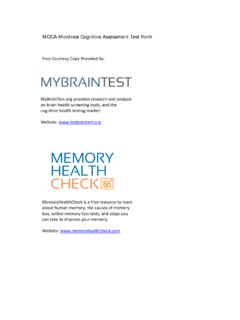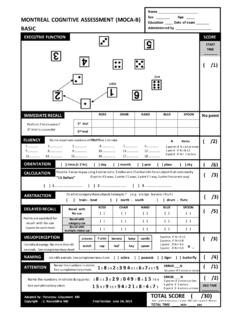Transcription of The relationship of montreal cognitive assessment scores ...
1 Open Journal of Psychiatry, 2011, 1, 49-55 OJPs ych Published Online July 2011 ( ). Published Online July 2011 in SciRes. The relationship of montreal cognitive assessment scores to framingham coronary and stroke risk scores Myron Frederick Weiner1,2*, Linda Susan Hynan1,3, Heidi Rossetti3, Matthew Wesley Warren1, Colin Munro Cullum1,2 1 Department of Psychiatry, University of Texas Southwestern Medical Center, Dallas, USA; 2 Department of Neurology, University of Texas Southwestern Medical Center, Dallas, USA; 3 Department of Clinical Sciences, University of Texas Southwestern Medical Center, Dallas, USA.
2 E-mail: Received 3 June 2011; revised 25 June 2011; accepted 3 July 2011. ABSTRACT We examined the relationship between a brief cogni-tive screening measure and Framingham Coronary and Stroke Risk scores . We administered the Mon-treal cognitive assessment (MoCA) to participants in the Dallas Heart Study, a community-based mul-tiethnic study investigating the development of athe-rosclerosis. The composition of the group was 50% African American, 36% Caucasian and 14% Hispan-ic.
3 There were 765 subjects (mean age 51 years) who had both Coronary and Stroke Risk scores and an additional 144 subjects with only Coronary Risk scores available. There was a small significant inverse relationship between MoCA and Framingham Coro-nary and Stroke Risk scores . MoCA scores were in-fluenced by education, but were not influenced by age or by the presence of one or more apoE4 alleles. Keywords: Dementia; montreal cognitive assessment ; Cognition; Cardiovascular Risk 1.
4 INTRODUCTION Because of the strong evidence for a relationship be-tween cardiovascular risk factors and cognitive com-promise [1], the authors were asked to provide a brief measure of psychological function for the Dallas Heart Study (DHS), a population-based study of the develop-ment of atherosclerosis. Earlier studies of the relation-ship between environmental and biological factors and cognition in large population-based studies of elders have produced some positive findings [2,3].
5 Specifically, hypertension in late life has been associated with cogni-tive decline [4,5] and thought possibly due to damaged brain vasculature. Additionally, increased total choles-terol has also been associated [6,7] and thought to be due to brain lipid dysregulation, although it is not always shown [8]. Most studies of Type 2 diabetes have found a positive association between impaired glucose metabol-ism and dementia [9,10]. Tak en together, metabolic syn-drome with and without markers of inflammation have been associated with cognitive decline [11].
6 To facilitate participation, DHS subjects were seen in a single day that included a variety of biological meas-ures. Because of the heavy schedule, DHS investigators required that our cognitive instrument be brief (15 mi-nutes or less). We reviewed brief instruments, including the Short Portable Mental Status Questionnaire [12], the Mini-mental State Examination [13] and the montreal cognitive assessment (MoCA) [14]. We chose the MoCA, a popular instrument for detecting mild cogni-tive impairment and dementia in clinical settings, be-cause of its greater sensitivity to memory and its inclu-sion of items reflecting executive function [15,16].
7 We hypothesized that MoCA scores would be related in-versely to Framingham Risk scores for coronary artery disease [17] and stroke [18], to older age and the pres-ence of one or more apolipoprotein E4 (apoE4) alleles and would correlate directly with years of education. We compared Framingham Coronary and Stroke risk scores obtained in 1999-2000 to MoCA scores obtained in 2008 and 2009. 2. MATERIAL AND METHODS The Dallas Heart Study (DHS) is a population-based investigation designed to track the development of car-diovascular disease; 50% of the sample is African American [19].
8 The project, funded by the Donald W. Reynolds Foundation, was initiated in 1999. The first wave of examinees (DHS-1) who completed the entire 3-day study protocol (approximately 3000 subjects ranging in age from 30 to 65 years), was not adminis-M. F. Weiner et al. / Open Journal of Psychiatry 1 (2011) 49-55 Copyright 2011 SciRes. OJPsych 50 tered a cognitive measure.
9 DHS-2 examined 3,500 sub-jects, largely returnees from DHS-1. cognitive screening was added to DHS-2 as part of a day-long visit that in-cluded extensive demographic and family history infor-mation, vital signs, EKG, measures of body fat, cardiac wall thickness, aortic plaque, coronary artery calcifica-tion, apoE genotype, and other measures. Additional DHS-2 measures included 3 Tesla MRI imaging of the brain, MRI determination of common carotid wall thickness, and a measure of depressive symptoms.
10 Framingham Coronary Risk and Stroke Risk scores were calculated from DHS-1 data. The Coronary Risk score is based on a formula including age, total choles-terol, cigarette smoking, high-density lipoprotein (HDL) concentration, and systolic blood pressure (see Ta b l e 1). scores for men range from 10 to 37; for women, from 8 to 44. When employed in an algorithm, these scores indicate the likelihood (as a percent risk) of a coronary event occurring within 10 years [20].
